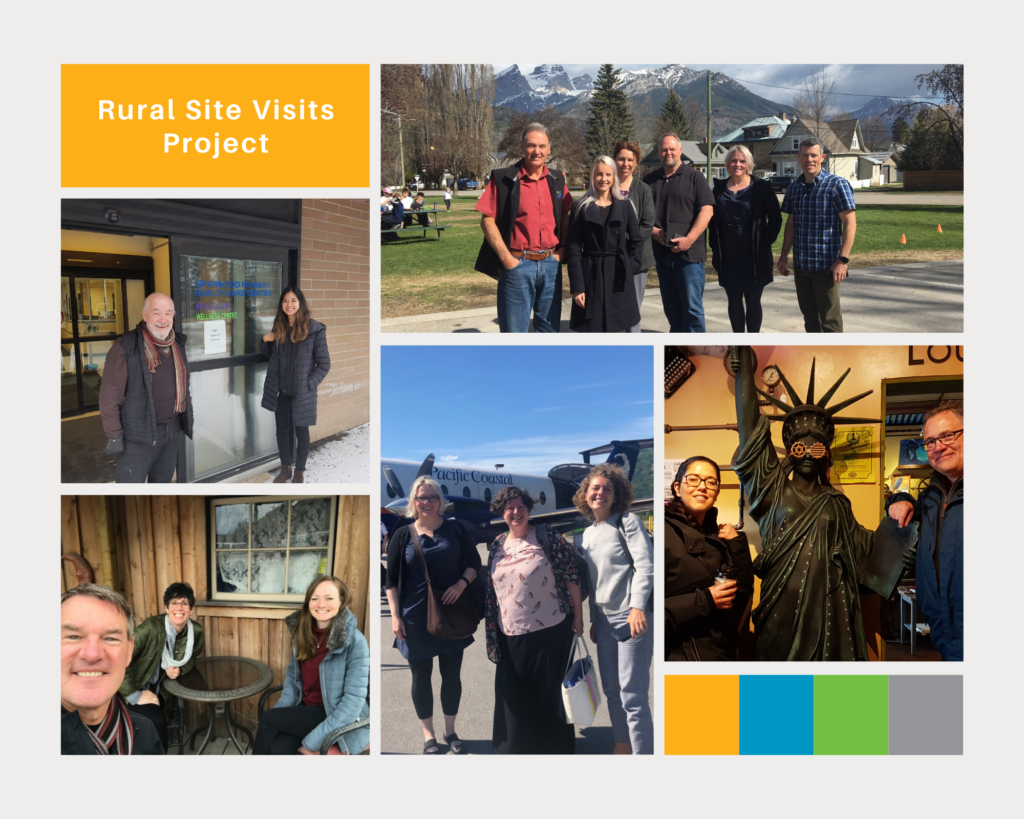With 107 visits to rural, remote, and First Nations communities in British Columbia (BC) under their belts, team members with the Rural Site Visits project at the Rural Coordination Centre of BC (RCCbc) are eager to get back on the road and into communities when it’s safe to do so, following a long hiatus caused by COVID-19.
The Rural Site Visits team is visiting all 202 rural, remote, and First Nations communities in BC that are covered by the (RSA) to learn their perspectives on healthcare delivery. Through meetings with community healthcare providers and administrators, First Nations bands, local leaders, community health organizations, first responders, and educators, the Rural Site Visits team, comprised of RCCbc staff and healthcare leads, finds out which elements of the health system are working well, or need improvement, in each community they visit. They then present this information to the Joint Standing Committee on Rural Issues to inform and improve provincial health policy and program development.
“Our team is passionate about improving rural healthcare,” explains Dr. Stuart Johnston, the former healthcare lead of the Rural Site Visits project at RCCbc. “Given our experience living and working in rural, remote, and First Nations communities, we understand the health inequities that these communities face. We feel privileged to amplify their voices and act as a conduit for sharing their perspectives with provincial policymakers.”
We feel privileged to amplify their voices and act as a conduit for sharing their perspectives with provincial policymakers.
Dr. Stuart Johnston
Before the pandemic closed much of the province in 2020, the Rural Site Visits team completed 382 meetings in half of all RSA communities in BC. When in-person visits could no longer be conducted in-person, the team trialed virtual visits with three communities; however, the lack of in-person engagement and relationship building, which is crucial to their work, was missing. As a result, they decided to wait until in-person visits could resume.
Although the future of the pandemic remains uncertain, the Rural Site Visits team hopes to conduct at least one community visit to Salmon Arm this autumn; however, this will depend upon public health orders and whether the community feels that it is safe, appropriate, and convenient.
“We recognize the difficult year that rural, remote, and First Nations communities have faced,” says Krystal Wong, Rural Site Visits project coordinator at RCCbc. “The pandemic has left an indelible mark on communities, and the ongoing drought and wildfires have added further strain. We look forward to meeting with communities whenever they feel the time is right.”
The pandemic has left an indelible mark on communities, and the ongoing drought and wildfires have added further strain. We look forward to meeting with communities whenever they feel the time is right.
Krystal Wong, Site Visits Project Coordinator
Despite the disruption to the community visits over the past year, the Rural Site Visits project team successfully pivoted to several related activities, including the creation of a dynamic website containing hundreds of rural health innovations designed and implemented by communities to improve citizens’ health and wellbeing. They have also been listening to, and learning from, Indigenous voices and enhancing the research component of their project to embed Indigenous methodologies in a way that increases reciprocity and relationship building.
Further to this, the team submitted manuscripts to BMJ Open on their process for conducting site visits, and to CMAJ on anti-Indigenous racism in health care. They also published two reports on youth mental health and addictions services, and the need for culturally safe maternity care.
Earlier this summer, the team also bid farewell to Dr. Johnston, who devised and led the project as RCCbc’s physician lead, as he transitioned to a second and, hopefully, final retirement. Dr. Danette Dawkin has taken on Dr. Johnston’s role.
“We’re so grateful for the leadership that Dr. Johnston has provided us in his role as healthcare lead,” says Krystal. “His experience as a rural physician, his calm and supportive demeanour, and his ability to establish strong and trusted relationships will be greatly missed by the entire team. We’re pleased that he’ll continue working with us on research components related to the project, and we welcome Dr. Dawkin to our team.”
For more information about the Rural Site Visits project, visit RCCbc’s website.



